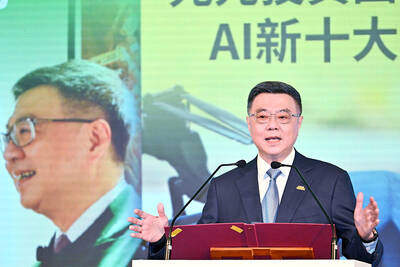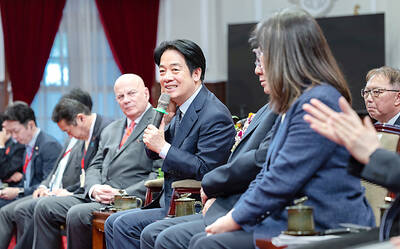The rebel Kurdistan Workers' Party (PKK) yesterday freed eight Turkish soldiers it had taken hostage as Ankara's prime minister left for Washington to seek concrete steps to crack down on the guerrillas.
The PKK handed over the soldiers to senior officials from Iraq's northern regional government at 7:30am, Abdurrahman Cadirci, the PKK's head of foreign relations, said.
"I personally handed them to Karim Sinjari, the internal affairs minister at the Kurdistan Regional Government and Othman Haji, the interior minister," Cadirci said.
He said the soldiers' release came after mediation from the Kurdistan Regional Government (KRG) and Ahmed Turk, the head of the Party for Democratic Society, a political group based in Turkey.
The KRG also confirmed the release of the eight.
"After personal attempts by Kurdistan regional president Massud Barzani, Iraqi President Jalal Talabani and Kurdistan regional prime minister Nechirvan Barzani, the Turkish soldiers who were detained by the PKK were released this morning," the KRG said in a statement.
Later yesterday, Fuad Hussain, a top Iraqi Kurdish official, said the soldiers had been flown to Turkey and their arrival in southeast Turkey's Diyarbakir by a military plane was reported by the television channel CNN-Turk.
The aircraft landed at a military air base where the soldiers were able to speak with their families by telephone, the state said.
Ankara vowed to continue the fight with the PKK.
"We will continue to fight the battle which we have fought from the start with total determination ... on the military, political, diplomatic and economic fronts against the scourge of terrorism," Turkish deputy prime minister Cemil Cicek told the Anatolia news agency.
The Turkish troops were captured when the PKK ambushed their unit near the border with Iraq on Oct. 21.
The attack left 12 other soldiers dead, raising regional tensions as Turkey threatened to launch military strikes in Iraqi territory to flush the rebels from their bases in the Qandil mountains along the border.
On Saturday, Ankara warned it still retains the option of a military strike inside northern Iraq to attack PKK rebels who have been fighting since 1984 for self-rule in southeastern Turkey.
"All instruments remain on the table for Turkey," Foreign Minister Ali Babacan said.
To further step up the pressure on Washington, which has urged Ankara to hold back on a military strike, Turkish Prime Minister Recep Tayyip Erdogan left on Saturday to meet US President George W. Bush.
"Our visit comes at a time when [Turkish-US] relations are undergoing a serious test," Erdogan told reporters at Istanbul airport.
"We have run out of patience with the terrorist attacks being staged from northern Iraq," he said, adding that he hoped his meeting with Bush today would produce "concrete measures."

Two US House of Representatives committees yesterday condemned China’s attempt to orchestrate a crash involving Vice President Hsiao Bi-khim’s (蕭美琴) car when she visited the Czech Republic last year as vice president-elect. Czech local media in March last year reported that a Chinese diplomat had run a red light while following Hsiao’s car from the airport, and Czech intelligence last week told local media that Chinese diplomats and agents had also planned to stage a demonstrative car collision. Hsiao on Saturday shared a Reuters news report on the incident through her account on social media platform X and wrote: “I

STILL ON THE TABLE: The government is not precluding advanced nuclear power generation if it is proven safer and the nuclear waste issue is solved, the premier said Taiwan is willing to be in step with the world by considering new methods of nuclear energy generation and to discuss alternative approaches to provide more stable power generation and help support industries, Premier Cho Jung-tai (卓榮泰) said yesterday. The government would continue to develop diverse and green energy solutions, which include considering advances in nuclear energy generation, he added. Cho’s remarks echoed President William Lai’s (賴清德) comments in an interview last month, saying the government is not precluding “advanced and newer nuclear power generation” if it is proven to be safer and the issue of nuclear waste is resolved. Lai’s comment had

‘BUILDING PARTNERSHIPS’: The US military’s aim is to continue to make any potential Chinese invasion more difficult than it already is, US General Ronald Clark said The likelihood of China invading Taiwan without contest is “very, very small” because the Taiwan Strait is under constant surveillance by multiple countries, a US general has said. General Ronald Clark, commanding officer of US Army Pacific (USARPAC), the US Army’s largest service component command, made the remarks during a dialogue hosted on Friday by Washington-based think tank the Center for Strategic and International Studies. Asked by the event host what the Chinese military has learned from its US counterpart over the years, Clark said that the first lesson is that the skill and will of US service members are “unmatched.” The second

STANDING TOGETHER: Amid China’s increasingly aggressive activities, nations must join forces in detecting and dealing with incursions, a Taiwanese official said Two senior Philippine officials and one former official yesterday attended the Taiwan International Ocean Forum in Taipei, the first high-level visit since the Philippines in April lifted a ban on such travel to Taiwan. The Ocean Affairs Council hosted the two-day event at the National Taiwan University Hospital International Convention Center. Philippine Navy spokesman Rear Admiral Roy Vincent Trinidad, Coast Guard spokesman Grand Commodore Jay Tarriela and former Philippine Presidential Communications Office assistant secretary Michel del Rosario participated in the forum. More than 100 officials, experts and entrepreneurs from 15 nations participated in the forum, which included discussions on countering China’s hybrid warfare